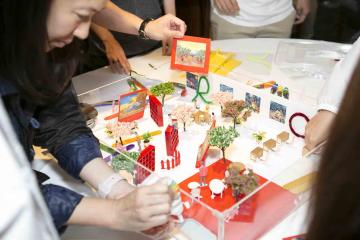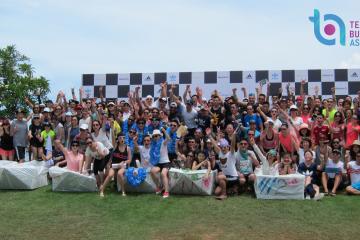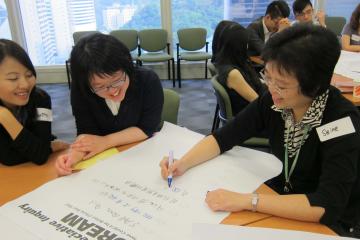Often companies tell us that they already do team building by organising a team dinner, a bowling session or drinks out. Which are great ideas to get together and have fun, but these don’t develop your team’s soft skills or teamwork skills.
Whether you are new to the company or an experienced HR manager, developing your team is an important part of your role. Moreover, team development isn’t only for new hires, everyone needs training and support throughout their career to develop their skills and work effectively – not only individually but also as a team.
In order to improve team collaboration, communication, trust-building, agility - in short - to build a solid team, here is a list of areas of team development that you can follow to start total team development today:
- Identify your employees’ training needs
This might be the hardest part of team development – finding where to begin. Start by unraveling your team members’ developmental needs by reviewing their job description, learning how they work and asking the right questions.For example, ask what their performance issues are and how they could be resolved. There are also some training needs assessment tools that you might want to look into. - Choosing the right training methods
Now that you have identified the needs, you can look at appropriate training methods for the areas where your employees can improve. There are different styles of training: on-the-job training, instructor-led training and active training. Research suggests that 70 percent of learning happens through experience, 20 percent through conversations and 10 percent through extra training. So, you need to give people the opportunity to use the skills they need to develop, discuss them with professional coaches and then train them accordingly. - Coaching
Many performance gaps can be closed through conversations and communication rather than training. Have regular one-on-one conversations with your team members to identify potential issues, help people to achieve their goals and address performance problems. There are several coaching models that can guide you. - Team building
In order to meet the training objectives, select your team building activity carefully. By doing this, you ensure that the event is more than a fun day out. For example, if you have noticed that there have been mistakes or missed deadlines due to poor communication, you probably want to select exercises that improve communication skills like listening, empathy and assertiveness. Some team building activities encourage engagement and develop leadership, while others improve problem-solving skills and improve your team’s agility. - Delegating work
A wise man once said that the only job leaders have is delegation. Effective delegation helps team effectiveness and productivity. When you delegate, make sure to manage the process carefully to achieve the best result for your staff. Set your team members up for success, give them support and guidance to complete the task. - Managing talent
Your HR department might have a formal talent management plan to identify and develop key skills, abilities and potential. You can identify members of your own team with specific talents, aid at retaining them and develop their skills, and work with HR to hire the right employees with the right skillset and support their development. - Follow-up and long-term strategy
Create plans to keep vital skills and knowledge if any of your team members decide to leave. Succession planning ensures that people pass on their skills, experience and knowledge to their colleagues. If you’re prepared for this and can manage these transitions, you will be able to deal with change more easily.
It’s not easy to build a high-performing team. It starts with clearly defined roles and keeping them on track at achieving their goals and targets.
Are you building an efficient team yet?
PS: did you know we can help you achieve total team development with our integral programmes?




